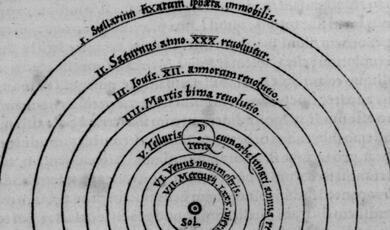Just War: Ancient influence on Islam and on the Spanish Conquistadors
Share
- Details
- Text
- Audio
- Downloads
- Extra Reading
The study of justice in war is ancient in India, Judaism, Greece, Rome, Christianity and Islam, and it is important to bear those traditions in mind at the present time. Tracing the influence of Genesis, of Aristotle, the Stoics, Cicero and the Roman jurists, we shall find an unexpected response in Islam, and the Spanish conquests, subjected to a year-long debate which transformed modern views on justice in war.
Download Text
Just War: Antiquity, Islam and the Spanish Conquistadors
Professor Richard Sorabji
The issues about war that face us today have been thought about for up to two and a half thousand years in all the cultures that are involved in the main present conflicts, Christianity, Judaism, Islam and India. So we need not think that we are facing them for the first time without guidance. I shall concentrate on a major 16th century debate about the conquest by Spaniards of the American Indians in what is now Latin America, because a number of issues it dealt with are also our issues today. I shall also trace the historical background to this debate that started 2100 years earlier in Graeco-Roman antiquity, and then passed through Christianity. I shall further compare in passing certain Jewish and Islamic approaches.
I The distinction ad bellum and in bello
First, a preliminary: the Christian tradition formulated a useful distinction between when it would be just to go to war (ius ad bellum), and how to conduct a war justly, whether it has been justly entered into, or not (ius in bello). The following five criteria for justly engaging in war are fairly widely agreed, although there are also longer lists:
There should be a just cause.
Attempts at peaceful resolution should have been exhausted.
The war should be decided on by an appropriate authority.
War will not make the situation even worse than it is already.
There should be a reasonable prospect of achieving the aims of the war.
The first requirement of just cause was already discussed by the Greek philosophers Plato and Aristotle in the 4th century BC, and by the Roman Cicero in the 1st century BC. The second requirement of attempts at peaceful resolution was, as Cicero says, embedded in the fetial code of ancient Rome. This code required that no war was just (bellum iustum), unless 30 days notice had been given with a warning or demand for restitution, and a formal declaration. But the criteria were very much further developed by the Christian tradition, especially from around 400AD with Augustine, though Augustine started with the advantage of being familiar with Cicero.
As regards the other question of justice in the conduct of war (ius in bello), the Christian tradition did not develop so quickly perhaps as some other traditions. The Greeks and Romans, especially Cicero, already had plenty to say. From the 8th to 12th centuries AD, there are discussions in Islam about not intentionally killing women or children, even the children of polytheists, about what to do if there are women and children in a fort you propose to attack, or if Muslims are used as human shields, and rejecting suicide or hopeless attacks. In the Jewish tradition, the sparing of fruit trees, already mentioned in Deuteronomy 20, is expanded by Maimonides in the 12th century, so as to ban other destructive acts, and to permit civilians to escape from a besieged city. It is in legislation since the late 19th century that Western interest has switched from ius ad bellum to ius in bello.
II Vitoria and Las Casas, 1539-1552
I come now to the case which should impress and inspire us of King Charles the Fifth of Spain, who in 1550 suspended the ongoing conquest of the American Indians, while a jury of theologians and counsellors evaluated a year-long philosophical debate, which was held in 1550-1551, to discuss its justice. The protagonists were Sepulveda, against the Indians, and Bartolome de Las Casas for them. Las Casas’ surviving In Defence of the Indians is a Latin revision, made after the debate, perhaps in 1552, of the Spanish ms, which he had written just before the debate. The standard request for permission to publish the original Spanish version was not granted, but the debate was a substitute.
Less impassioned and more theoretical than Las Casas was Francisco de Vitoria. Both Spaniards had been writing on related issues for many years at the time of the debate, and Vitoria too had defended the Indians, even though with more qualifications. His On the Indians and his related On the Law of War were both delivered at Salamanca in 1539. In these works, Las Casas and Vitoria address many of the issues that face us today.
1 Innocent non-combatants. First, they both prohibit the killing of innocents, and offer lists of types of innocent non-combatant. They would be far from condoning the modern bombing of civilian populations. But would they even allow collateral deaths of civilians? They concede certain exceptions. Sometimes killing is accidental, as when there are civilians along with soldiers in a fort, or as when one cannot distinguish a foreign merchant visitor from one of the enemy. But even so, in the case of the fort, the exception is allowed only with heavy restrictions. The war must be just in the first place, taking the fort must be actually necessary for victory in the war, and the evil effects of proceeding must not outweigh the good. This last is the proportionality rule, which we have noticed as governing one’s embarking on war in the first place. So if the only means to victory are too costly of innocent life, one should presumably re-evaluate one’s decision to fight at all. This is a high standard. But both refer to the even higher standard of St Paul, who in Romans 3.8 rejects saying, ‘let us do evil, that good may come’. This would not even allow calculations of proportionality.
There is no reference to sending conscripts to their death, because the Spanish Conquistadors were not conscripts, but adventurers, and in any case conscripts cannot be viewed as innocents. Rather, we rob conscripts of their innocence and make them legitimate targets, when we place them in the role of threatening the enemy. Questions here should be about our having sufficient grounds to make them legitimate targets, rather than about their innocence.
2 Intervening in another country to rescue some members of it.Both writers had to face the suggestion that it would be just to declare war on the Indians to protect the victims of human sacrifice. Vitoria allows this as a just cause in one brief paragraph, but Las Casas opposes the idea at 12 chapters’ length and gives a number of reasons.
(i) First, it is wrong to kill even one innocent, but further it is against natural law to bring about more evil than good (proportionality again), and in rescuing the victims of sacrifice, we would kill more people than were victims, and more than were sacrificers. This point is equally relevant to modern advocacy of intervention, which we need to consider if the bad effects would outweigh the good.
(ii) Las Casas also cites Christ’s parable of the wheat and the tares (or weeds) from Matthew 13.29, which had been cited for a related purpose long before by Augustine’s older contemporary, John Chrysostom (died 409 AD). In rooting out the weeds, one can damage the corn. Equally, attacking the Indians because of those guilty of sacrifice will put off the innocent, and make them hate Christianity, thereby preventing the conversion that was so important to Las Casas. Although we may not share his interest in conversion, we should take note of his concern with psychology. In modern predicaments too, the right psychology may achieve one’s objectives more effectively than military force.
(iii) Finally, Las Casas draws a contrast. Sacrificing to God is prompted by natural law, which turns into the law of nations. But what to sacrifice is, as Aristotle says in Politics 1.1, a matter of human law, and open to honest error. It is not obvious by the light of natural reason that human sacrifice is wrong. God prompted Abraham to sacrifice his son, and Christ himself was in a way offered as a sacrifice. What language would the Spaniards use to explain to the Indians their error on so difficult a point?
3 Preemptive strike and preemptive execution or detention.Vitoria in On the Law of War rules out pre-emptive strike with the convincing argument that we do not execute individuals in civil society because of sins that lie in the future. I am not clear that he manages to stick to the position. For a little later, he allows that one might execute hostages, if they would otherwise become combatants, and that one might execute combatant prisoners after the war, if they impose an implacable danger, as would only be plausible in the case of infidels. We ourselves have to face a similar question about enemy prisoners currently transported from Afghanistan to Cuba. Their very treatment there might make them implacable. Would it in that case be just never to release them? To combat terrorism after September 2001, it is reported that the UK and US introduced a law permitting the indefinite imprisonment of non-citizen suspects without trial, legal representation, or notification of family. If this is true, and if this was for possible future crimes, it would presumably be rejected by Vitoria.
4 Regime change. In On the Law of War, Vitoria also asks if one is entitled to depose the enemy government at the end of a war. His answer, ‘not normally’ contrasts with present proposals concerning Iraq not only to replace a government, but to replace it with members of a different culture and religion, namely ourselves. However, Vitoria does allow two exceptions. One is the case in which regime change is needed for the security of the conquered nation itself. The other is that in which the injuries done by the former government are great enough.
So far we have seen discussed the deaths of innocent civilians as a reason against war, the need to observe proportionality as regards such deaths, and to reassess the appropriateness of war, if they are a necessary means. We have seen the ban on intervention to rescue victims of another country where that would cause disproportionate new civilian deaths. We have seen the prudence of considering the psychological effects of warfare in obstructing one’s ultimate goals through animosities created. We have seen the ban on pre-emptive strike, pre-emptive execution, and the implications for pre-emptive detention without legal process. And we have seen the restrictions on regime change. All this was addressed in the sixteenth century, despite the difference of context. I shall now pick out 6 aspects of the ancient background to the discussion of the Conquistadors, which will further reveal the difference of intellectual context.
III The Ancient Background
1 Natural Slaves.
The first issue discussed by Vitoria, On the Indians, and Las Casas, Defence, was the charge that the Indians were in Aristotle’s sense natural slaves. Aristotle in the 4th century BC justified the universal Greek practice of slavery by saying that some people needed a master, because they lack the deliberative power (to bouleutikon) to plan their own lives, Politics 1.13, 1260a12-15, and so are natural slaves. They can listen to someone else’s reason, but this means that they only share in reason, Politics 1.5,1254b21-3, or possess reason only in a secondary sense, Nicomachean Ethics 1.13, 1103a1-3. It is to the credit of the orator Alcidamas, to be mentioned below, in the same century, and of the Stoic Chrysippus in the following century, that they denied that any human is a slave by nature, Chrysippus adding that irrational animals take the place of slaves. But Cicero, as Augustine comments at length, seeks to justify Rome’s dominion through the idea that Rome is ruling over slave peoples. Aristotle’s mistake is not, as Leibniz says, that there are no such people as Aristotle describes. Some people may feel that some of their best friends or colleagues cannot plan their own lives. The mistake is to say that they should be enslaved.
How do Las Casas and Vitoria treat the claim that the Indians are natural slaves? Las Casas, in Defence Ch. 2, takes Aristotle to mean by natural slaves a much rarer category, the totally solitary outsider discussed by Aristotle in Politics 1.2. Las Casas can easily say that the Indians are not like that. Vitoria has a different defence. In On the Indians Q.1. he takes the question to be whether the Indians have dominium, that is, the right to property and self-governance. In Q.1,a.1, he says that even natural slaves have dominium. So too (Q.1,a.5) do children. As for the claim that the Indians lack dominium because they are mad, madness is disproved by their elaborate institutions (Q.1,a.6). Vitoria does not decide on a further claim (Q.3,a.8) that they may be uneducated like abandoned orphans, but he says that if so, that would only justify ruling them for their own benefit.
2 Dominium.
The idea of dominion appears in the Book of Genesis 1.26, which says that God gave dominion to humans over the animals. Cicero in the first century BC, knowing nothing of this, writes in a passage already discussed that dominium is supplied by nature for certain kinds of rule, that of God, mind and reason over lower things. This is a prelude to his defence of Rome’s empire. Augustine returns to the subject after 400 AD. Although human dominium was at first granted by God only over animals, Adam’s sin and fall resulted in dominium being extended over human slaves as well as animals. Augustine would have sympathised with the view of the Stoic Chrysippus that it would have been natural for animals only to fulfil the role of slaves.
3 Natural law.
The idea of natural law appears early in Greek thought with the first examples in the fifth century BC. Heraclitus says that all human laws are nourished by a divine law that is sufficient for all. Socrates is represented as persuading the sophist Hippias that there are unwritten laws made by the gods. The idea of a common law in accordance with nature, and a common natural justice independent of community and contract, is said by Aristotle to be the theme of two fifth century texts and a fourth century one, although Aristotle’s appeal to nature is not explicit in the first two. Thus Antigone in Sophocles’ play knows that the king’s law forbids her to bury her brother, but appeals at line 456 to the ever-living unwritten laws of the gods. Again, the philosopher Empedocles regards the ban on killing animals as a law (nomimon) for all, not as something just only for some people. The orator Alcidamas declared that nature had made nobody a slave. The Stoic school, which started in 300 BC, is reported as speaking of natural law and identifying it with reason, and this will have influenced Cicero’s extensive references in the first century BC. Cicero says that the true law is right reason in accordance with nature, but it comes from God, even though it is also described as being received from nature. He also makes the law internal to one, saying that one must follow the Delphic precept, ‘Know thyself’, because the law is in oneself (in se) as so many shadowy understandings (adumbratae intelligentiae).
Augustine was able to draw both on Cicero and on St Paul, who wrote of gentiles without the law, who nonetheless have what the law requires ‘written in their hearts’ - a phrase borrowed from the Book of Jeremiah. Augustine uses the phrase, when he tells of his stealing pears just for the pleasure of stealing. He had a law against theft written in his heart.
4 Law of Nations.
The first explicit references to the law of nations (ius gentium) are in Cicero’s On Duties. But he does not yet distinguish the law of nations from the law of nature that is within us. His examples are of not injuring people and not cheating them, e.g in the sale of your house. Tony Honore has a theory about how the law of nature and the law of nations came to be distinguished well over 200 years later. In 212 AD, Roman citizenship was extended throughout the Empire. So the law of nations could no longer be seen as a natural unwritten law superior to the written laws applying to Roman citizens. It was downgraded for this reason and also because it accepted slavery, which some felt was contrary to natural law. The jurist Ulpian at this time both distinguishes the law of nations from natural law, and makes natural law give some protection to slaves, which is rather modest, but based on wider principles. Honore entitles the second edition of his book (Oxford 2002) Ulpian, Pioneer of Human Rights, and reports in Chapter 3 Ulpian’s saying that by natural law humans are equal, and so the master should enforce debts owed by others to the slave’s purse. Humans are by natural law born free, so the practice of freeing them can only be based on the (inferior) law of nations. Slaves are by nature entitled to injure themselves to avoid work, without loss of purse.
5 Individual human rights.
The case for saying that this represents a pioneering recognition of human rights must depend on the general principles cited rather than on the rather minimal concessions made to slaves. In an earlier book, I praised the Stoics of the third century BC for having a theory of justice as owed to all humans, including slaves and barbarians, but I denied that it was a theory of human rights. The Stoics considered it your duty to do everything in your power to bestow the things we naturally prefer, like health and food, on yourself and other people. But if, through no fault of yours, your best efforts fail to sustain those for whom you are responsible, the Stoics would not think that their death really mattered in the end. For what really matters is character and rationality. Hence what matters is your having acted virtuously, and their dying in a virtuous way. A theory of rights, by contrast, takes it to matter whether the human needs are actually met, not merely whether the obligatory effort was made. Another suggestion made in the mid-19th century about the origin of the idea of human rights was that it arose out of the ideas of natural law and of the law of nations. If Honore’s suggestions are right, it will have arisen out of the idea of natural law at a time when that was being distinguished from the law of nations. The distinction did not always remain firm, however.
A strong case has been made for individual human rights being recognised by Vitoria and Las Casas in connexion with the idea of natural law and/or the law of nations. Vitoria says in his commentary of 1535 on Thomas Aquinas’ Summa Theologiae that originally, after the creation of the world, anyone (quilibet) was dominus, i.e. had dominion, over all created things, but only to use them, not to own them. This reference to ‘anyone’ has been seen as represnting an individual human right. When, as Genesis 13,9 tells us, Abraham and Lot agreed to divide up the land, then there was ownership, but it was due to the law of nations, not to natural law. Las Casas treats the matter differently in a very late work, On the Treasures of Peru. The Indians, he claims, have dominia and principatus, rights of property and self-rule, by both natural law and the law of nations. Moreover the rights of rule are individualised. Individuals (singuli), or even one vote, can invalidate rule by the Spaniards.
6 The state of nature.
The schools of the Stoics and Epicureans were founded in Athens just after Aristotle’s death, in 308 and 300 BC respectively. They disagreed on the natural relation of humans to each other. According to the Stoics, it is natural to feel attachment (oikeiosis) to one’s fellow human beings, and hence justice is natural, which is not to say that it is easy to achieve, but that it would be in accordance with nature, if one could achieve it. According to the Epicureans, it is natural for everyone to seek his or her own pleasure, and hence justice is a faute de mieux, which depends on a self-interested contract. The philosopher, Thomas Hobbes, was to cite the Epicureans in support of his idea that the state of nature for humans was nasty, brutish and short, and hence that a sovereign was agreed on by contract to keep the peace. This ought to have some bearing on international relations, for nations do not have a sovereign over them, and so are in the position of individual humans who have not, or not yet, made a contract. What, then, is the natural relation of nations? An Epicurean or Hobbesian might expect it to be naturally one of suspicion, a Stoic one of amity.
There is little doubt that Vitoria and Las Casas sided with the Stoics. Vitoria, echoing Cicero On Laws 1.23, says in his On Civil Power of 1528, that the world is a single republic. That is why it enacts the law of nations. Las Casas interrupts the Spanish of his Apologetic History of the Indians, which may be of a similarly early date, to quote at length the Latin of Cicero On Laws 1.29-33, and to emphasise that all humans are alike, and that the only definition of the human is rationality.
IV Pacifism and non-pacifism in different traditions.
I now come to a final issue, the relation of different cultures to pacificism. Christianity started with a tension between the Old Testament with its bloodthirsty wars and the New Testament with Christ’s injunction, if struck on one cheek, to turn the other, Matthew 5,39, Luke 6,29. Such early Christians as Tertullian, the contemporary of Ulpian at the beginning of the 3rd century AD, and Origen in the middle of that century held that Christians should not fight. Tertullian says that a Christian cannot forsake all for Christ, if he is a soldier, and he takes the injunction to turn the other cheek as reinterpreting the ancient Judaic law of an eye for an eye and a tooth for a tooth. That means only that you should not take someone’s eye, because if you were to, he would take yours. Origen explains that war was necessary for the ancient Jews, but now would be forbidden them by Rome. Elsewhere he gives spiritual reinterpretations of the Old Testament wars.
Augustine in the early fifth century changes all this. he too was pressed, in this case by the Manichaeans, on the discrepancy between Old and New Testaments. Augustine responded that Christians are allowed to fight, and the injunction to turn the other cheek is only about the inward disposition of the martyr. The need to turn the other cheek can only be revealed along with the revelation of the Kingdom of heaven in the New Testament.
Once Christians are expected to fight, a doctrine is needed of justice in war, and that is why Augustine did so much to develop the idea, although, as we have seen, neither the idea nor the expression was new, and Augustine was able to draw on the pagan Cicero, as well as on St Paul.
The Jewish and Islamic traditions started from the opposite end with a presumption of warfare, and so it was an uphill task for Averroes in Islam and Maimonides for Judaism to modify the original ideas. Both thinkers originated in Cordoba in Spain in the 12th century AD. I am grateful to Noah Feldman, whose D.Phil dissertation revealed to me Averroes’ unexpected use of Aristotle, and who clarified for me other relevant texts of these authors.
The problem in Islam, as explained by Averroes, is that different verses of the Koran appear to differ on whether polytheists who refuse to convert after hearing the message should all be killed. Some verses suggest they should, while others allow that some polytheists might be captured and released, or allowed to pay poll tax and subject themselves, while other verses again advocate peace. The treatment of monotheistic Jews and Christians is clearer. They should not be forced to convert, but only to pay the poll tax and live as subject peoples. Averroes tells of the historical interpretation of the verses on polytheists, according to which only Arab polytheists were meant. The war verses were written later, and this might be taken to be because it was only later in the Prophet’s life that the conquest of Mecca became a practical possibility. If, however, the verses are taken to have a universal meaning, one must decide whether the peace verses are abrogated, or whether they permit a truce in the war on polytheists, and if so, for how long. What is remarkable, as Feldman has shown, is that Averroes, as a commentator on Aristotle’s Nicomachean Ethics, takes up Aristotle’s idea that judges must be allowed discretion, because the written law is too general to provide for the particularities of the case. Averroes illustrates this with the idea that the responsible authorities could decide to halt the killing of polytheists, if this was in the interests of Islam.
The ancient Jewish discussion in Deuteronomy 20, 10-20, while requiring peace to be offered first on terms of servitude, and fruit trees to be spared in a siege, is sterner with those who do not yield. Some cities have been promised to the Israelites by God as an inheritance, and there nothing shall be left alive that breathes, because of their abominable polytheist practices. With cities further away, all males shall be killed, but women children, cattle and all spoils shall be taken as booty. Maimonides expanded this account in an era long after the Jews had ceased to have an army or kings, and although he kept many of the harsh elements, he did try to moderate them. I have already mentioned his ban on wanton destruction and his allowing civilians to escape from a siege. But in addition he adds that, with the wars not commanded by God, the enemy may be offered peace on more generous terms. Feldman has pointed out that although the king could still take half their goods, the proposed terms, of paying tribute and becoming subject peoples, were the comparatively moderate Islamic ones under which Maimonides as a Jew had originally lived in Cordoba under Islamic rule. Moreover, the further requirement of adherence to 7 commandments was a reference to the comparatively acceptable commandments of Noah: no idolatry, no cursing of God, no illicit bloodshed, no illegal sex, no theft, civil law to be established, no eating of living flesh.
Starting then from opposite directions, Augustine, Averroes and Maimonides were leading their respective religions towards greater convergence on the rights and wrongs of war. Maimonides’ non-religious wars were intended to expand the border or glorify the king, and these two motives were precisely ruled out as not just causes for war by Vitoria in the laws of war, as also was difference of religion which partly motivates the religious wars. So convergence is far from complete with Vitoria’s concept of just war. But then Maimonides is not presenting his non-religious wars as just in themselves (ad bellum), but is only discussing the in bello quesion of how to conduct them justly.
I have spoken about just war. I am not an expert on actual war. But as a lay observer, I think justice may have become more relevant to the actual outcome of anti-guerrilla and anti-terrorist wars. As Tony Blair has so well understood in Northern Ireland, and many Americans after the Vietnam war, these wars cannot be won merely by superiority of weapons. It has to be perceived that apparent injustices are really being addressed, if one's objectives are to be secured. The lessons so well learnt in Northern Ireland and Vietnam are applicable to more recent conflicts too.
© Richard Sorabji, 13 November 2002
This event was on Wed, 13 Nov 2002
Support Gresham
Gresham College has offered an outstanding education to the public free of charge for over 400 years. Today, Gresham College plays an important role in fostering a love of learning and a greater understanding of ourselves and the world around us. Your donation will help to widen our reach and to broaden our audience, allowing more people to benefit from a high-quality education from some of the brightest minds.


 Login
Login







